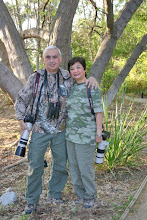"Looks like there is an injured bird over there." I told Cynthia as I hurried to where the bird was lying. I could tell that the poor House Finch was on the throes of death: eyes half closed, beak partly open as it gasped for breath. There were no blood or wounds so it must be due to a natural cause.
"It's dying", I informed my wife.
"Give it water", she suggested."Maybe it's just suffering from heat stroke".
Indeed the temperature was in the high 90's but I've seen this condition before when I was still breeding finches and I just know that water would be of no help at all. Nevertheless, I filled a saucer with cool water. Dipping my finger in the water, I placed it on the tip of the poor bird's beak, hoping it would sense the refreshing touch. I told Cynthia that it was not responding and that I wouldn't want it to suffer any more that it already does by being swarmed by ants and bottle flies while still alive.
Memories of a similar incident flooded my mind. It was a couple of summers ago at San Joaquin Wildlife Sanctuary in Irvine. Cynthia and I were birding the trail along Pond D when I noticed a young Pied Billed Grebe slumped ahead of us. The first thought that came to my mind was it was probably due the heat. Closer inspection revealed that the baby bird was alive, but fading fast. Ants had begun to crawl all over its inert body. Cynthia ran back to the Audubon Center to report the incident only to be told that they (the people manning the center) were not allowed to touch birds. I can't believe that the Audubon staff members would be so heartless and insensitive to the very creatures they were supposed to protect and care for. I knew I had to do something. I cannnot, in good conscience, allow this young grebe to just wither away albeit tortured by the numerous ant bites it was already suffering without a little help. I pulled out my handkerchief, slowly brushed off the ants crawling all over the bird's body. Then I picked it up and gently placed it on the waters of the pond, hoping it still has the instinct to float and swim. I scooped some water and trickled it on the grebe. To our surprise and joy, the little grebe revived from its stupor and slowly swam away toward the shelter of the reeds. In that moment I knew in my heart that this precious creature would survive.
I was quite certain that the situation of the finch before me would not have the same happy ending. I walked back to the house to get a piece of cloth where I could place the bird to prevent the ants and the flies from making it more miserable that it already was. When I came back holding a blue piece of cloth, I saw the bird gave one last gasp and then it closed it eyes permanently. I picked it up and placed in on the cloth that I brought, noticing how emaciated it was. I don't know what caused its death and at this point, I did not really care. This was the first time I saw a wild bird die that was not a victim of some predator. I wonder if this was a better way for them to perish than being seized by the talons of a hungry hawk. Do birds feel pain during their last moments on earth? Are they even aware that they are dying? I do know that not one of them falls to the ground apart from the will of God. (Matthew 10:29). Each one of us on earth that has breath has an appointed time to die. Today, it was this particular young House Finch's time. I thought it was only appropriate to give it a decent burial.



1 comment:
Very sad. Luckily, I have not had that experience yet, though I have seen injured birds that I thought would not make it.
Post a Comment